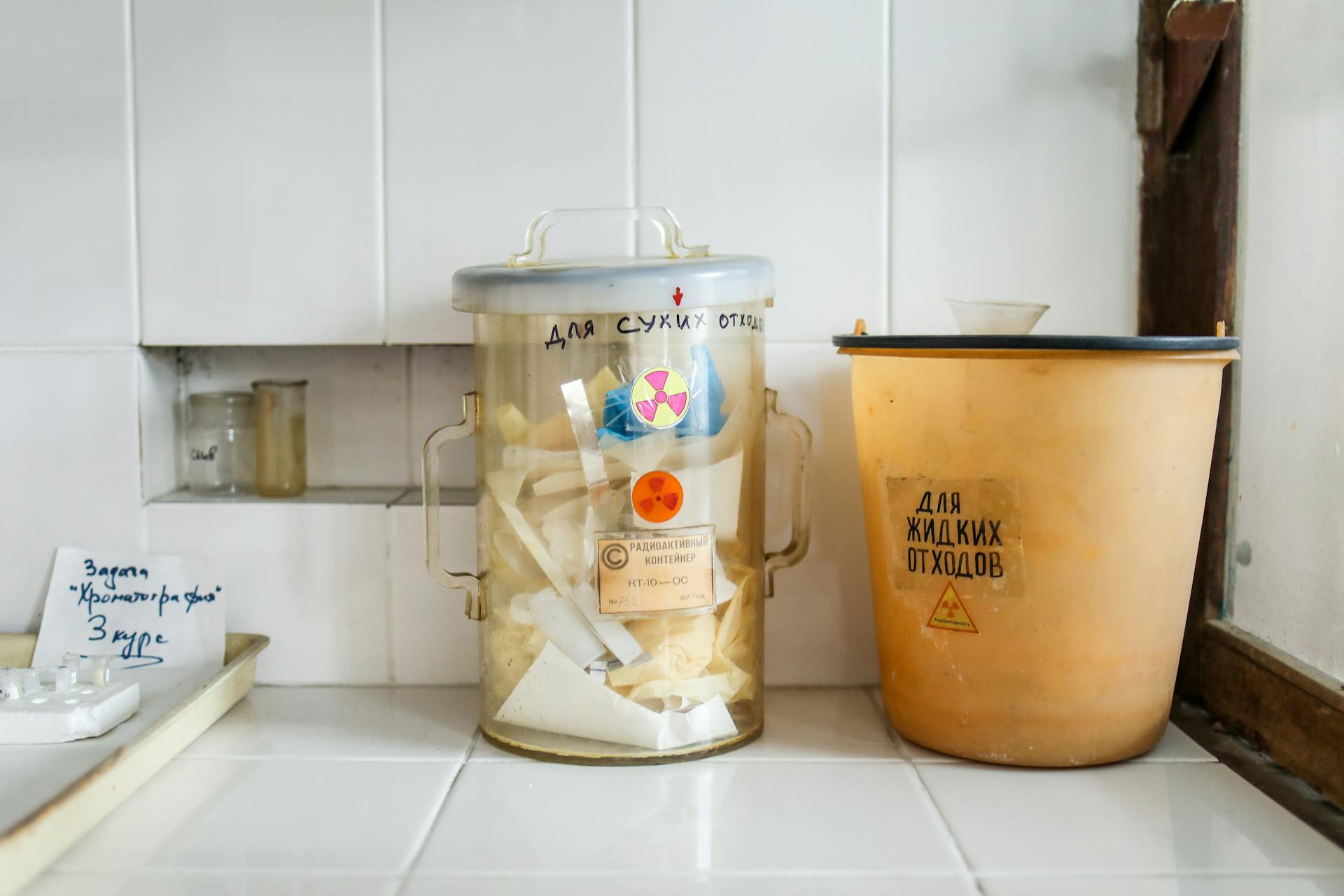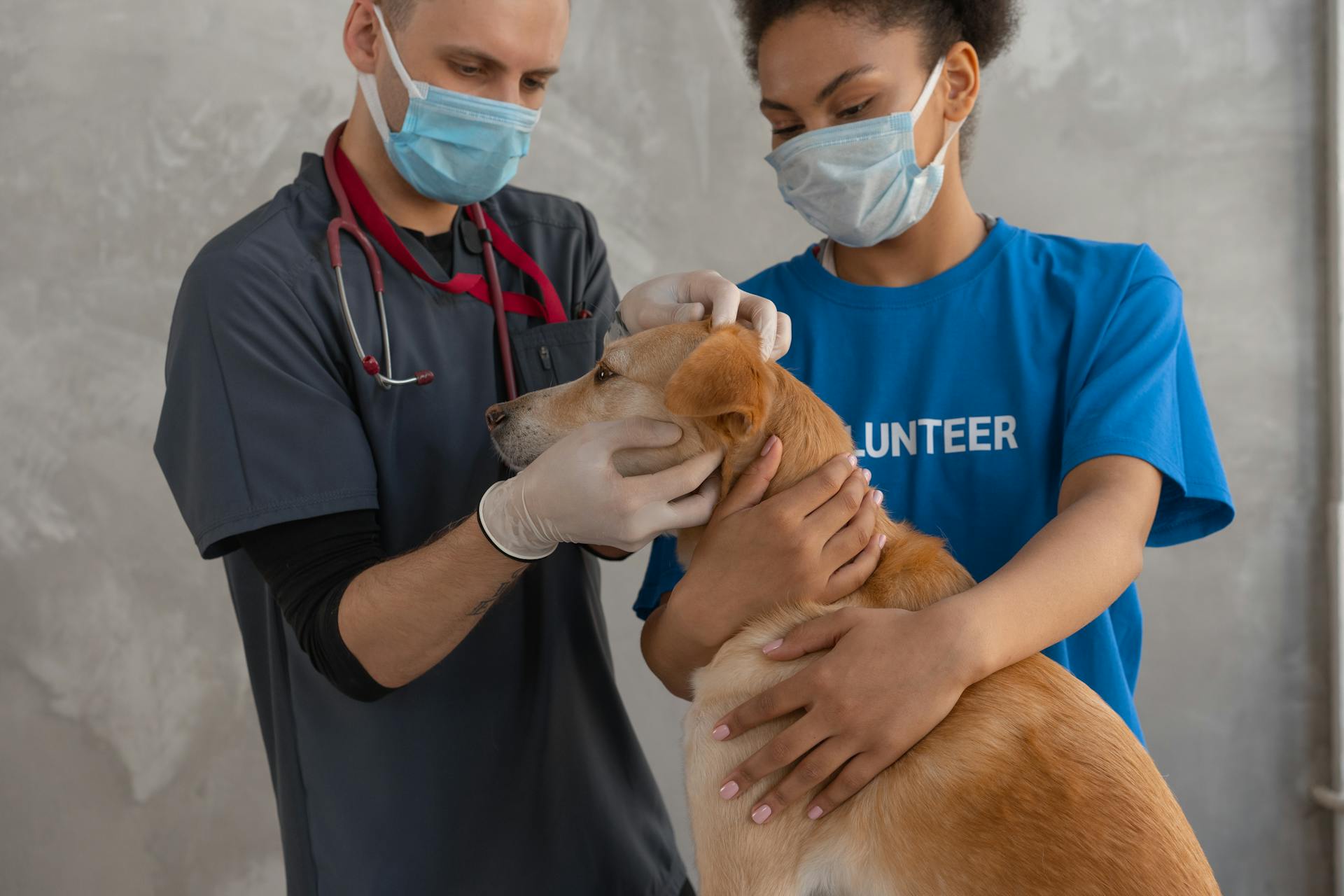
If your dog has ingested something toxic, it's essential to act fast. The sooner you intervene, the better chance your dog has at a successful recovery.
Symptoms of poisoning can vary depending on the substance, but common signs include vomiting, diarrhea, lethargy, and difficulty breathing. Keep an eye out for these symptoms and seek veterinary care immediately.
In some cases, poisoning can cause cardiac arrest or seizures, so it's crucial to stay calm and focused on getting your dog to a vet ASAP.
If this caught your attention, see: Antifreeze Dog Poison Symptoms
Signs and Types of Poisoning
If you suspect your dog has ingested rat poison, it's crucial to act quickly, as Dr. Stephanie Howell, DVM, emphasizes.
The type of toxicant ingested can determine the symptoms that appear. Anticoagulants, for example, can cause bleeding disorders in dogs.
Bleeding disorders can manifest as bleeding from the nose, gums, or rectum, as well as bruising or swelling in various parts of the body.
Signs of Poisoning in Dogs
Signs of poisoning in dogs can be subtle, but it's crucial to know what to look for. If your dog ingested a rodenticide, symptoms can appear within minutes to hours.
Possible symptoms of rat poisoning include vomiting, diarrhea, and lethargy. It's essential to be aware of these signs, especially if you suspect your dog has ingested rat poison.
Some common symptoms of anticoagulant rodenticides include bleeding, bruising, and nosebleeds. This is because these toxins interfere with blood clotting.
Other symptoms may include seizures, tremors, and difficulty breathing. If you notice any of these symptoms, seek veterinary attention immediately.
In severe cases, anticoagulant rodenticides can cause internal bleeding, which can be life-threatening. Don't wait for symptoms to appear - if you suspect rat poisoning, take action right away.
A different take: Dog Poison Symptoms
Rat Poison Types
There are three main types of rat poison: anticoagulant rodenticides, bromethalin rodenticides, and cholecalciferol (vitamin D3) rodenticides. Each type works differently and can cause different medical complications in dogs.
Anticoagulant rodenticides are the most common type and can be first-generation or second-generation. First-generation anticoagulants include chlorophacinone, diphacinone, pindone, and warfarin, while second-generation anticoagulants are even more potent and include brodifacoum, bromadiolone, difenacoum, and difethialone.
Here are the three main types of rat poison:
Bromethalin rodenticides can cause severe neurologic symptoms if not treated promptly, while cholecalciferol rodenticides can cause symptoms such as vomiting, diarrhea, and lethargy.
A fresh viewpoint: Rat Poison Symptoms Dog
What to Do If Your Dog Eats Poison
If your dog eats poison, it's crucial to act quickly. Call a pet poison helpline or your local emergency vet right away.
The sooner you get your dog to the vet, the better their chances of recovery. Don't take a watch-and-wait approach, as this can lead to severe toxicity signs.
The type of treatment your dog needs will depend on the type of poison they consumed. For example, if your dog eats rat poison, your vet may need to treat them with vitamin K1 or a blood transfusion in severe cases.
Broaden your view: Vets Dog Treats
If you're not sure what your dog ate, your vet will likely start with tests to determine the type of poison. This can help them choose the best course of treatment.
If your dog is showing signs of poisoning, such as severe neurologic symptoms, the prognosis for recovery is poor. Prompt treatment is essential to avoid these severe symptoms.
To decontaminate your dog, your vet may induce vomiting, administer activated charcoal to absorb the contents of their stomach, or try to flush out the toxin. They may also administer certain medications to keep the kidneys functioning.
In some cases, your dog may need dialysis or other life support if their kidneys fail. Euthanasia may be the only practical alternative left in these situations.
Here are some steps to follow if your dog eats rat poison:
- Call a pet poison helpline or your local emergency vet.
- Take your dog to the emergency vet.
Remember, every dog is different, and the treatment plan will be tailored to their specific needs.
Treatment and Recovery
The type of treatment your dog needs depends on the type of poison they consumed, with anticoagulant rodenticides requiring vitamin K1 or blood transfusions in severe cases.
If your dog eats an anticoagulant rodenticide, your vet may need to treat them with vitamin K1 or even a blood transfusion in severe cases. There is no specific medication to reverse the effects of bromethalin rodenticide.
Decontamination and supportive care are the only options for bromethalin rodenticide poisoning, and identifying the type of rat poison is crucial for determining the best course of treatment.
If your dog is showing signs of grape poisoning, your vet will start procedures to remove any toxin that might remain in its system, which may include inducing vomiting, flushing out the stomach, or administering activated charcoal.
Your vet may also administer medications to keep the kidneys functioning if they start to fail, and if testing shows that the toxins are in your dog's bloodstream, they may begin IV therapy.
A unique perspective: Treatment for Dog Poisoned by Rat Poison
Dog Supplements

You can use supplements to support your dog's detox process. Providing good groceries and clean supplements can help nurture optimal liver function.
Some supplements can cause discharges, such as nasal, eyes, or ears, but your dog should feel fine. If you notice more serious detox reactions, like flu-like symptoms, back off on the detox and things should correct.
A dose or two of homeopathic Nux vomica 30C can help alleviate severe detox symptoms. Vitamin C is the most important antioxidant for the liver, and even though dogs produce their own, a little extra help during a toxic exposure or cleanse is a good idea.
Mixed ascorbates are a good choice because they are buffered, absorbable, and economical. Whole food Vitamin C from plant sources like camu camu and acerola berries is also very absorbable.
Additional reading: How to Detox My Dog from Bravecto?
Treatment for Toxicity
If your dog eats rat poison, prompt treatment is crucial. Dr. Howell advises calling a pet poison helpline or your local emergency vet.

The type of treatment your dog needs depends on the type of rat poison consumed. Each rodenticide has a different mechanism for causing toxicity, so identifying the type is essential.
Your vet may need to treat your dog with vitamin K1 or a blood transfusion if they consumed an anticoagulant rodenticide. In severe cases, a blood transfusion may be necessary.
For bromethalin rodenticide, there is no specific medication to reverse the effects. Decontamination and supportive care are the only options.
If your dog eats rat poison, don't wait to see if they'll be okay. Head to the emergency vet immediately if you suspect poisoning.
Here are some common treatments for toxicities:
In some cases, like grape poisoning, your vet may induce vomiting or try to flush out the toxin. They may also administer medications to keep your dog's kidneys functioning.
Understanding the Impact
If your dog ingests a toxic substance, the impact can be severe and potentially life-threatening.
The severity of the symptoms depends on the type and amount of poison consumed, with some toxins causing vomiting, diarrhea, and lethargy, while others can lead to seizures, tremors, and even heart failure.
In cases of severe poisoning, your dog may experience respiratory failure, which can be fatal if not treated promptly.
Prompt treatment is crucial to minimize the impact of poisoning and prevent long-term damage to your dog's health.
The sooner you seek veterinary attention, the better the chances of a successful outcome.
Featured Images: pexels.com


